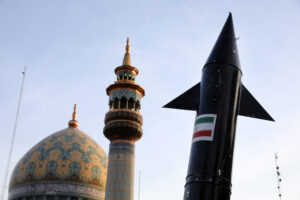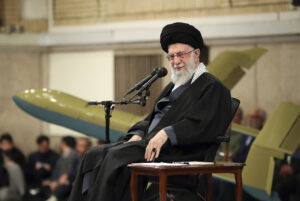Iran: Bush’s Next Disaster?
Although the president claims he has no intention of attacking Iran, his every action indicates otherwise.Whatever George W. Bush may tell us about his intentions toward Iran, every action and order indicates that he will seek to expand the war eastward from Iraq. Despite the warnings voiced by military and diplomatic advisers, the president still seems to be listening to the same discredited neoconservatives whose fantasies and falsehoods drove us into the Iraqi quagmire.
If their plotting succeeds in provoking military conflict with Iran, the resulting carnage could indeed make Iraq look like a “cakewalk,” to quote one of the more stupid predictions that preceded the current war.
Imagine firefights erupting along the Persian Gulf and violent uprisings among the Shiite masses in the Baghdad slums and southern Iraq — and then imagine the entire region convulsed by ethnic and religious conflict. The potential consequences could be catastrophic, from the closing of the gulf straits and a new oil crisis to ruptured political alliances and terrible American casualties.
Yet regardless of these risks, the Bush administration’s urge to provoke Iran is as unmistakable as its preparations for a wider war. Nearly every day, the White House sends obvious signals of belligerence to Tehran, with the same drumbeat heard during the months that led up to the invasion of Iraq.
The president announces that he will deploy Patriot batteries to the region, which can be useful only in shooting down Iranian missiles. The president sends another carrier battle group to the gulf, with an air wing poised to strike Iranian nuclear sites. The president appoints an admiral whose specialty is naval air combat to run Central Command for the Middle East region. The president orders an armed raid on an Iranian diplomatic office in northern Iraq, which nearly results in a shootout with Kurdish troops.
With great fanfare, the president issues a military directive allowing U.S. troops to kill Iranian agents discovered in Iraq, even though those same agents are often guests of the Iraqi government we support. And without irony, he declares that the Iranians — whose friendship with Iraq seems more durable than ours — will be held “accountable” for meddling in their neighbor’s internal affairs.
As in the march toward war with Iraq, the justification for military action against Iran is the looming threat supposedly posed by the regime’s pursuit of nuclear weapons. But according to Mohamed ElBaradei — the International Atomic Energy Agency chief whose assessment of Iraq proved correct — Iran cannot make an atomic weapon within the next five years. So the rush to war is premature. Those who now insist otherwise were wrong and dishonest about Saddam Hussein’s phantom arsenal.
If the Bush administration’s policies are meant to diminish Iran, they have been a dismal failure so far. Encouraging Israel to fight a proxy war against Hezbollah in Lebanon, for instance, only increased Iran’s regional prestige, while weakening more moderate Arab regimes, which rightly fear the aggressive extremism of Iranian President Mahmoud Ahmadinejad.
Is there an alternative to military confrontation with the mullahs? Only three years ago, Ahmadinejad’s predecessors secretly tried to open negotiations with the United States. According to a recent BBC report, Iranian leaders offered to reduce their support for armed Lebanese and Palestinian militants to help stabilize post-Saddam Iraq, and to open their nuclear program to full inspection; in return, they wanted to restore diplomatic relations and commerce. But former State Department officials confirm that the White House, under the baneful gaze of Vice President Dick Cheney, spurned that olive branch as an unacceptable compromise with “evil.”
By rejecting Iran’s tentative offer, the Bush administration abetted the rise of Ahmadinejad, a populist and fundamentalist who prefers confrontation to compromise. But that policy has entailed severe costs for the Iranian people, who are suffering from inflation and sanctions as well as from fear of war. The Iranians increasingly despise their own government, which faces constant rumors of its own fall.
What sustains Ahmadinejad against both his own people and world opinion is the prospect of military aggression by the United States. Americans are not the only people who feel the “rally effect” that brings populations together in times of external attack. The more we rely on such threats as the basis for U.S. policy, the more we bolster our enemies — and the closer we come to pulling the trigger, with incalculable consequences.
President Bush insists that he has no plans to attack Iran, but of course he promised that war on Iraq would be a last resort. Let’s hope he is telling the truth this time.
Joe Conason writes for The New York Observer (www.observer.com).
Your support matters…Independent journalism is under threat and overshadowed by heavily funded mainstream media.
You can help level the playing field. Become a member.
Your tax-deductible contribution keeps us digging beneath the headlines to give you thought-provoking, investigative reporting and analysis that unearths what's really happening- without compromise.
Give today to support our courageous, independent journalists.






You need to be a supporter to comment.
There are currently no responses to this article.
Be the first to respond.